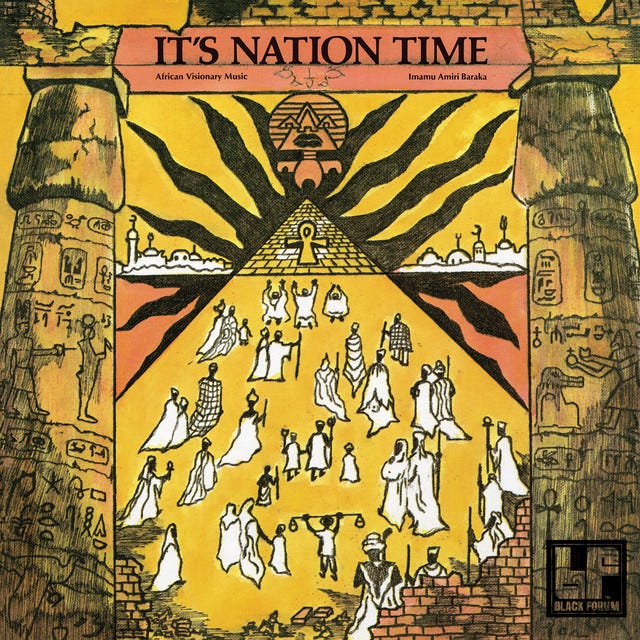Genre of the Day - Jazz Poetry
Album of the Day - It's Nation Time by Imamu Amiri Baraka (1972)
The best-selling album of 2024, surely, is going to be the manifesto of a tortured poet. I still don’t fully understand how tongue-in-cheek that title was meant to be. My most optimistic interpretation is that she may have been slyly referencing the rote, iterative nature of self-expression at the highest caliber, of the internal strife in one’s near-institutionalized production of more, more, more anguished songs for the masses. Or it just sounded vaguely artsy. Anyway, in some alternative world, it would’ve been called the Tortured Jazz Poets’ Department. As we enter this October, the month of my birthday—only slightly sunken by sharing it with somebody who absolutely destroyed my heart—I am hoping for possibilities. Maybe one possibility is that jazz poetry will make a comeback thanks to the prominence of tortured poetry. You never know.
Recently, I got to explore one of the most astounding, fascinating concepts for a genre in tone poem. Tone poem, though, uses music to transcribe words rather than pair music with words. Jazz poetry is a more literal marriage of its two elements. In the 1920s, jazz rose to prominence as a form at the same time when poems were finding new mediums of transmission, jumping off the page into emerging sound recording and radio technologies. Though that was the wider context that catalyzed their connection into a musical form, the more immediate history was in the sparks lit off in the great poetic minds who experienced the rise of jazz as a novel, radical musical expression.
The Harlem Renaissance was the most important orchard in which these artistic fruits were hybridized. Langston Hughes, in particular, was keenly aware of jazz as an expressive force for Black people that modulated writing and that could lend it unfettered rhythmic and stylistic creativity, noting the way it “seep[ed] into words—spelled out words.” Jazz influenced these writers’ structures, syntax, and rhythms, but jazz poetry also manifested as poems with the music and its proponents as muses and, of course, poetry being read over jazz playing. Beat poets would once again embrace jazz as a musical setting for poetry in the 1950s, and the confluence of impassioned oration with new forms of Black music amidst the strivings for liberation and advancement in the ‘60s and ‘70s lit a fire under a new generation of jazz poets.
“With his ebony hands on each ivory key
He made that poor piano moan with melody.
O Blues!
Swaying to and fro on his rickety stool
He played that sad raggy tune like a musical fool.
Sweet Blues!
Coming from a black man’s soul.
O Blues!”
– The Weary Blues, Langston Hughes
As Amiri Baraka expounds upon his declarations, questions, and aspirations for the liberation of Black Americans in the search for a new nation on 1972’s It’s Nation Time, his persistently prodding delivery grabs you in a way few other musical expressions can. The poet’s urgency lies in his upbringing in Newark; by the time of this album’s release, the city was the US’ most dangerous city for crime, one of its most impoverished, and had shockingly high rates of infant mortality. For Baraka, there was no time nor respectability to waste. As a spoken musical form, this iteration of jazz poetry almost feels like breaking down the fourth wall—despite the lack of singing, it is more resonant in a way because of the communicative directness. Softer moments like the languid yet insistent groove and gorgeous piano glissandos of “All in the Street” ratchet up into a frenzy of jazz sax that surrounds and reinforces his energetic bursts impress deeply upon the listener. As the album progresses, the music traces the line of Black expression up to the ‘70s, referencing the most mass-market in “Come See About Us” Supremes interpreted through Baraka’s Black nationalist lens and dense funk thickets on “Kutoa Umoja” as he slams divisions and emphasizes unity. Poetically, it is better heard than described; my short vignettes really can not do his pontifical, often shockign, passion justice. In meeting, jazz and poetry underscore the need for action in their cosmic realization of passion.





You might like this collection of mostly classical art song settings of Langston Hughes poetry with the great Maria Corley playing piano on most.
Evil is my favorite poem, it should really be the motto of my Substack
https://music.youtube.com/playlist?list=OLAK5uy_looTSYep4xJLnUESZjsUmwxqGxfCuAuAI&si=OvxOiY4uwkAIcIo3
Lana del Rey's Violet's Bent Backwards a modern take on the genre, and there were interesting examples from some of the best poets.